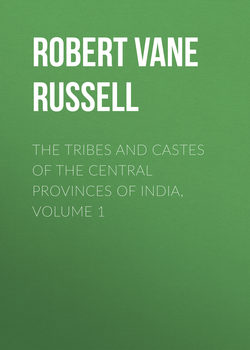Читать книгу The Tribes and Castes of the Central Provinces of India, Volume 1 - Robert Vane Russell - Страница 33
Part I.
Introductory Essay on Caste
Introductory Essay on Caste
30. Household servants
ОглавлениеSome of the castes already mentioned, and one or two others having the same status, work as household servants as well as village menials. The Dhīmar is most commonly employed as an indoor servant in Hindu households, and is permitted to knead flour in water and make it into a cake, which the Brāhman then takes and puts on the girdle with his own hands. He can boil water and pour pulse into the cooking-pot from above, so long as he does not touch the vessel after the food has been placed in it. He will take any remains of food left in the cooking-pot, as this is not considered to be polluted, food only becoming polluted when the hand touches it on the dish after having touched the mouth. When this happens, all the food on the dish becomes jūtha or leavings of food, and as a general rule no caste except the sweepers will eat these leavings of food of another caste or of another person of their own. Only a wife, whose meal follows her husband’s, will eat his leavings. As a servant, the Dhīmar is very familiar with his master; he may enter any part of the house, including the cooking-place and the women’s rooms, and he addresses his mistress as ‘Mother.’ When he lights his master’s pipe he takes the first pull himself, to show that it has not been tampered with, and then presents it to him with his left hand placed under his right elbow in token of respect. Maid-servants frequently belong also to the Dhīmar caste, and it often happens that the master of the household has illicit intercourse with them. Hence there is a proverb: ‘The king’s son draws water and the water-bearer’s son sits on the throne,’—similar intrigues on the part of high-born women with their servants being not unknown. The Kahār or palanquin-bearer was probably the same caste as the Dhīmar. Landowners would maintain a gang of Kahārs to carry them on journeys, allotting to such men plots of land rent-free. Our use of the word ‘bearer’ in the sense of a body-servant has developed from the palanquin-bearer who became a personal attendant on his master. Well-to-do families often have a Nai or barber as a hereditary family servant, the office descending in the barber’s family. Such a man arranges the marriages of the children and takes a considerable part in conducting them, and acts as escort to the women of the family when they go on a journey. Among his daily duties are to rub his master’s body with oil, massage his limbs, prepare his bed, tell him stories to send him to sleep, and so on. The barber’s wife attends on women in childbirth after the days of pollution are over, and rubs oil on the bodies of her clients, pares their nails and paints their feet with red dye at marriages and on other festival occasions. The Bāri or maker of leaf-plates is another household servant. Plates made of large leaves fastened together with little wooden pins and strips of fibre are commonly used by the Hindus for eating food, as are little leaf-cups for drinking; glazed earthenware has hitherto not been commonly manufactured, and that with a rougher surface becomes ceremonially impure by contact with any strange person or thing. Metal vessels and plates are the only alternative to those made of leaves, and there are frequently not enough of them to go round for a party. The Bāris also work as personal servants, hand round water, and light and carry torches at entertainments and on journeys. Their women are maids to high-caste Hindu ladies, and as they are always about the zenana are liable to lose their virtue.
